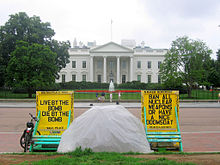Live by the sword, die by the sword
The phrase comes from Matthew 26:52, in which one of Jesus's disciples is described as having struck the servant of the High Priest of Israel and cut off his ear.
Early Christian theologians were almost universally pacifists, with Justin Martyr, Hippolytus of Rome, Tertullian, and Origen all making strong statements against soldiering and bearing weapons.
Thus, contrary to the common proverbial understanding, St. John Chrysostom explains where there is God's will (not the will of men) there is no need to react in passion.
[8] A very similar line can be found in the Agamemnon, the first play of the Oresteia trilogy by the ancient Greek tragedian and playwright Aeschylus.
[9][10][11] The line, spoken by Queen Clytemnestra of Mycenae after she murders her husband King Agamemnon in an act of vengeance, is rendered in the original Greek and translated to English (with varying levels of similarity to the original) as: ξιφοδηλήτῳ, θανάτῳ τίσας ᾇπερ ἦρχεν.

